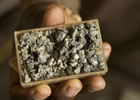
This article originally appeared in Global Post.
WASHINGTON — In central Africa there is a proverb: The way to eat an elephant is one bite at a time.
Recently, the U.S. Congress, with the support of advocacy groups, faith-based organizations and concerned citizens nationwide have shown that they understand our national connection to the horrific conflict in eastern Congo and have taken their first bite of elephant.
The conflict in the Congo is one of the most complex the world has ever seen. As American citizens we should realize we can only do so much, but more importantly we should realize that we can do something.
Like it or not, the most effective way to create political will in the United States is by amplifying people’s voices through their dollars and consumption habits. The recent passage of a conflict minerals provision embedded within the Dodd-Frank Financial Regulatory Reform Bill is a testament to a group of American citizens and policymakers understanding the ways we can make a difference, and understanding that small steps and persistence will ultimately yield success.
The new bill requires U.S. companies that use tin, tantalum and tungsten — the three T’s — as well as gold, to annually disclose their methods of determining whether their materials originated from the Congo or not and in turn, whether through acquiring those minerals they have directly or indirectly funded armed militants.
Like any legislative reform, the provision has its critics. Some complain that this method of resolving the issue of conflict minerals is over-simplistic, and that the new law will require burdensome reporting requirements, lead to de facto boycotts on mining in the region and create job losses causing increased instability.
The truth of the matter, however, is that inaction on this issue is unacceptable and — for companies that source minerals from eastern Congo and hope to continue to move along the path of the status quo — tantamount to complicity.
The trade in minerals comprised of the 3T’s as well as gold is a primary driver of the conflict in Congo, which has claimed more than 5 million lives, displaced millions more and is directly responsible for a reported 1,100 rapes per month.
These minerals are primary components of the vast array of gadgetry we now consider essential in our everyday lives — mobile phones, laptops, mp3 music players and jewelry to name a few. There is no escaping the connectivity. The new bill is intended to combine U.S. government, private sector and consumer pressure to bolster the government and civil society of the Congo and to reduce the presence of armed groups in the region known to have committed some of the worst human rights atrocities in history.
Both the bill and the Enough Project are working to create legitimate, legal and peaceful mineral trade programs in Congo that would benefit both private sector development and war-weary communities that have absorbed so much destruction.
The Enough Project is categorically opposed to any form of boycott and we are urging our supporters to pressure companies who use these minerals to commit to producing conflict-free products. With the passage of this recent legislation, companies can now make a positive impact in the Congo.
However this is just the tip of a much larger spear. Governments, companies and nongovernmental organizations (NGOs) need to go further by implementing three critical steps to creating a legitimate mineral trade in eastern Congo. We propose starting with a framework to trace, audit and certify.
To continue reading, click here.
Photo: Tin ore (Sasha Lezhnev/ Grassroots Reconciliation Group.)

